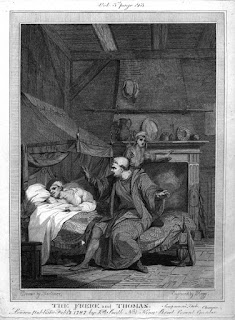After the Friar finished his story, the Summoner calls in question its veracity, by aligning the Friar with fiends, claiming that they keep good company. He relates a rather deprecating story about an angel taking a friar through Hell and, upon seeing not one Friar and asking if all Friars were saved, the angel has Satan lift up his tail and, exposing his anus, out flies from there twenty thousand Friars. Having sufficiently insulted the Friar’s occupation, the Summoner tells his tale.
 |
| The Summoner source Wikimedia Commons |
There was a Friar in the area of Holdernesse, who travelled around receiving gifts from the people in return for his promised prayers, which he never remembered to give. Upon visiting a church member, Thomas, the Friar fondles his wife and listens to her complaints about her husband’s illness and his bad temper. He assures her that her dead child went to heaven because he saw it in a vision, and then proceeds to sermonize about how fasting brings moral purity and gluttony, corruption. His sermons continue to Thomas, as he tries to convince him to give more money to the church to relieve his sufferings, and goes on, ad nauseum, about the glorious virtues of friars. He berates Thomas for his anger and employs the extensive use of classic examples to support his points.
 |
| The Friar and Thomas (1787) John Mortimer |
Finally, Thomas, disgusted beyond measure by the pomp and officiousness contemptibility of the Friar and his “false dissimulation”, tells him that he has a gift and that he will give it to him only upon the condition that he promises to share it with the other friars. The Friar readily agrees and Thomas instructs:
“‘Now then, put in they hand down by my back,’
Said this man, ‘and grope well behind.
Benearth my buttock where shalt thou find
A thing that I have hidden in private.'”
Middle English:
“‘Now thanne, put in thyn hand doun by my bak,’
Deyde this man, ‘and grope wel bihynde.
Bynethe my buttok there a shaltow fynde
A thyng that I have hyd in pryvetee’.”
The Friar reaches between the cleft of Thomas’ buttocks, but the gift is not what he expected:
“Amid his hand he let the friar a fart;
There is no horse, pulling cart,
That could have let a fart of such a sound.”
Middle English:
“Amydde his hand he leet the frere a fart;
Ther nys no capul, drawynge in a cart,
That myghte have lete a fart of swich a soun.”
 |
| An Augustinian Friar Praying Gerard David source Wikiart |
Enraged, the Friar takes himself off and comes upon a Lord with his Lady; he freely shares his ire prompted by this insulting action. Both are shocked, but the Lord is more perplexed by the scientific problem: Can a fart be shared? His servant comes to the rescue, suggesting using a cartwheel with twelve spokes and, if one puts each of the friars at the end of the spokes and then get the churl (Thomas) to fart in the “nave”, the resulting stink can be shared by all. All, except the Friar, are impressed with the servant’s brilliant answer.
Both the Summon and the Friar are portrayed as hypocrites, saying one thing, while their actions portray another. Instead of being concerned with the souls of people, they are only interested in their own well-being and comfort.
The Man of Law’s Tale
The Wife of Bath’s Tale
The Friar’s Tale
The Summoner’s Tale
The Clerk’s Tale
The Merchant’s Tale
The Squire’s Tale
The Franklin’s Tale
The Physician’s Tale
The Pardoner’s Tale
The Shipman’s Tale
The Prioress’s Tale
The Tale of Sir Thopas
The Tale of Melibee
The Monk’s Tale
The Nun’s Priest’s Tale



I have to read the Canterbury Tales for my SPIN book. How would you suggest that I read them? I'm thinking just the prologue and that is sufficient? Because I hate reading poetry and I cannot read Middle English!!! Any ideas would be helpful.
Well, if you just read the prologue, you won't have read The Canterbury Tales, would you? 😉
That's too bad that you hate poetry and Middle English. I thought I disliked poetry but, after reading Homer, I realized that I loved it. And it's fortunate that all poetry is different, so each experience is unique.
Luckily you don't have to read The Canterbury Tales in Middle English as there are numerous editions in Modern English.
I think taking it sections/tales at a time, like O and I have been doing, is a helpful way to read it, much better than trying to read it all at once. In any case, I really encourage you to read it; it's lots of fun and gives you a peek into medieval history.
I guess so. So I will have to read one tale per day – more or less – to get them all read by October 23 and have time to write a review of each as well. Thank you. Good luck with your Spin Book.
Honestly I'd read at your own pace and if you go over the deadline, oh well! At least you will have read it. And it's much better to enjoy a book than feel grumpy after you've finished it because you've rushed through it. That's why I was terrified of getting The Faerie Queene. Brrr! 😉 I think I'm going to read it in early 2016 just so I don't get it on a spin with that dreaded deadline.
In any case, the best of luck with The Canterbury Tales. I love it and I hope you do too!
This comment has been removed by the author.
That is true – there is nothing to say that I have to read ALL the tales by the deadline. Just some of them. So maybe I can limit myself to 5 or 10 tales. That's a good idea. That takes some of the pressure and stress off me as well. Thanks again.